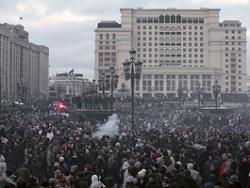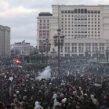
Nationalist Uprising in Moscow has Serious Implications for the North Caucasus
Publication: Eurasia Daily Monitor Volume: 7 Issue: 224
By:

On December 11, the largest ever Russian nationalist riots in modern Russia broke out in Moscow. The protesters, consisting of about 5,000 soccer fans and members of several Russian nationalist organizations, gathered at Manezh Square, which is adjacent to the Kremlin and Red Square. They shouted “Russia for Russians,” “Moscow for Muscovites,” and expletive-filled anti-Caucasian slogans, and attacked passersby who were assumed to be from the Caucasus or of Asian origin. Moscow’s police chief, Vladimir Kolokoltsev, arrived at the scene and tried to calm the crowd down, with partial success. The protesters eventually clashed with police, who pressed them out of the square into the Moscow metro, where the rioters continued to attack those they deemed non-Russians, specifically those with darker facial features and of Asian appearance, accompanying their assaults with shouts of “Kill!” (Kommersant, December 13).
The unrest in Moscow followed the December 6 murder of a fan of the Moscow soccer club Spartak, Yegor Sviridov, in a street fight with a group of North Caucasians. Sviridov was reportedly shot in the head with a legally owned rubber bullet pistol. The suspects were quickly arrested, but then only the primary suspect, Aslan Cherkesov of Kabardino-Balkaria, remained in custody while the others were released and allegedly fled. The editor-in-chief of the liberal Russian magazine The New Times said that the relatives of the North Caucasians paid a $25,000-$30,000 bribe for each of the detained people to ensure their release (Ekho Moskvy, December 14). Spartak fans took to the streets supported by Russian nationalist organizations and the rally turned into one of the biggest public protests in Russia in recent years.
The Russian government’s reaction to the riots was markedly muted. President Dmitry Medvedev communicated a vague message of the need to support order and obliquely admitted that the police had not been very successful in quelling the riots. In particular, Medvedev called on the police to “make use of all the available powers and means” to suppress violence (www.kremlin.ru, December 13). Indeed, the gathering at Manezh Square was initially observed only by several policemen, even though it had been known in advance there would be a protest.
There was also a practical response on the Russian government’s side. On December 11, Medvedev decreed the establishment of commissions under the regional governors that would oversee the law enforcement agencies’ activities and work hand-in-hand with them to support law and order (www.kremlin.ru, December 11). This move betrays some fear on the part of the Kremlin that the situation might slip out of its hands. The decree was immediately derided by some observers, who equated Medvedev’s actions to the feverish decisions taken by Mikhail Gorbachev at the demise of the USSR when, as one observer wrote, “to the essential political challenges, instead of political responses, the government provided administrative ones founded on the illusion of the omnipotence of the bureaucratic apparatus and the law enforcement agencies” (www.apn.ru, December 14).
Meanwhile, rumors abound in Moscow that the Caucasians will respond with some kind of mass protest in Moscow on December 15. Anonymous messages were posted on the Internet and even texted to people on their cellular phones. It is unknown whether there really will be a clash or Russian nationalists are simply trying to solidify support for their groups in this way.
Conspiracy theories have mushroomed about who might be behind these riots, with some suggesting that Prime Minister, Vladimir Putin, could benefit from destabilization, as it would allow him to replace Medvedev for not having been able to cope with the situation. Others claim the authorities needed to distract the public’s attention from Mikhail Khodorkovsky’s trial on fresh charges, with the judge set to start reading the verdict in this highly controversial trial on December 15.
Whatever political intrigue may be behind the Moscow riots, this uprising is bound to have very serious consequences for Moscow’s policies in the North Caucasus and for relations between the North Caucasus and Moscow. The government strategy to resettle unemployed North Caucasians in inner parts of Russia while sending ethnic Russians to the North Caucasus in an attempt to bind the region to Russia is now completely out of the question. The present Russian government is likely either to adopt part of the Russian nationalist agenda and slogans or face a larger scale uprising of the Russian people. It is more likely that the government will try to appease the Russian nationalists, which in turn might antagonize some of the North Caucasian republics.
Antagonism has surfaced even between the Moscow-picked governors of the North Caucasus and their Russian counterparts. While Kabardino-Balkaria’s President, Arsen Kanokov, and Karachaevo-Cherkessia’s President, Boris Ebzeyev, called the uprising in Moscow “a provocation” and an attempt to “artificially explode interethnic relations in Russia,” the governor of neighboring Russian-populated Stavropol, Valery Gaevsky, stressed the need to closely watch “the migrants” (i.e. Russian citizens from the North Caucasus). “They [the North Caucasian migrants] need to be forced to respect the traditions of the land, they stay on, the native [ethnic Russian] population,” Gaevsky stated (www.skfonews.ru, December 14). The same website, which is believed to be close to the Russian government, published comments by a person from Kabardino-Balkaria who said that the republic was on the verge of exploding if Russia did not properly assess the attacks on North Caucasians in Moscow. The article was subsequently scrapped from the website.
The riots in Moscow also had reverberations in other Russian cities. On December 12 in Rostov-on-Don, which is adjacent to the North Caucasus and has traditionally had a sizeable population of North Caucasians, several thousand people protested against the killing of a Russian student by an Ingush classmate. The authorities did not seem to mind the demonstration, in which protesters shouted, “Rostov is a [ethnic] Russian city.” Subsequently, the local government banned Caucasians from performing traditional dances on the streets of the city (www.gazeta.ru, December 14).
In an express poll by a popular Russian radio station, 87 percent of the listeners expressed support for the demonstrators in Moscow. A few popular Russian journalists expressed their solidarity not only with the protesters but also with their offensive slogans (www.vz.ru, December 12).
Moscow’s ability to use the Soviet-era slogans of “people’s friendship” and “ethnic peace” is finally totally out of question. Russian civil society is underdeveloped, and the powers that be will therefore be forced to incorporate more Russian nationalist rhetoric into their policies. This might put the North Caucasus on a path toward separation from Russia.




